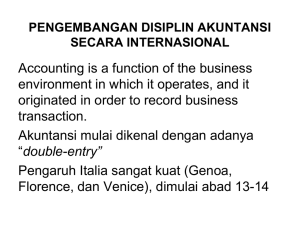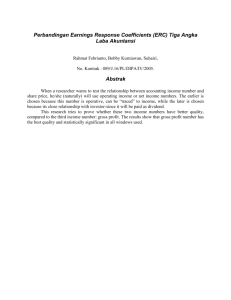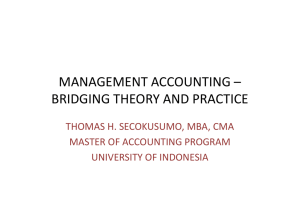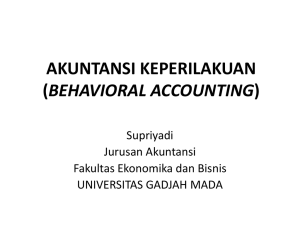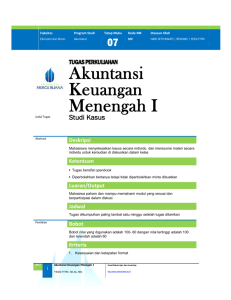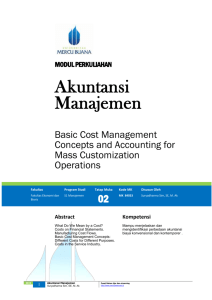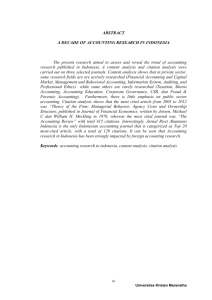Selayang Pandang: Akuntansi Multiparadigma
advertisement
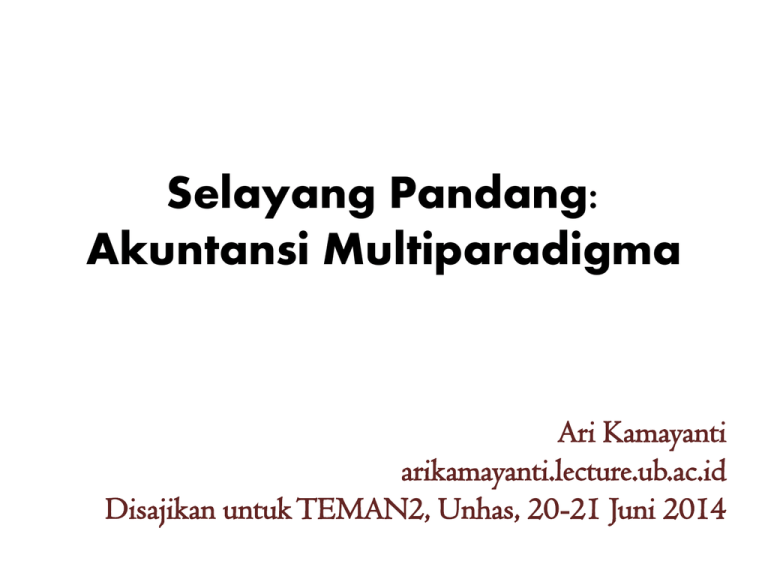
Selayang Pandang: Akuntansi Multiparadigma Ari Kamayanti arikamayanti.lecture.ub.ac.id Disajikan untuk TEMAN2, Unhas, 20-21 Juni 2014 Kesombongan Pengetahuan • Kita terbiasa atau dibiasakan dengan satu kebenaran tunggal... Dan tidak boleh ada kebenaran di lain kebenaran yang kita yakini... • Atau... • Kita terbiasa meyakini bahwa suatu “kesalahan” adalah kebenaran yang tidak perlu dipertanyakan...? Contoh: • Soal kelas 3 SD IPS: • Berikan tanda silang (x) pada jawaban yang benar: • Tugas kakek adalah: – A. Memasak – B. Bekerja – C. Mendongeng – D. Menjahit How do we construct truth/reality?Bagaimana kita memandang akuntansi? Paradigma= worldview= faith (iman) • Multiparadigma tidak berarti bahwa anda harus meninggalkan keyakinan anda... • Multiparadigma berarti memahami bahwa berbagai keyakinan memiliki “kebenaran”nya masing-masing. • Multiparadigma berarti menghargai berbagai pendapat, dan membuka diri kepada kemungkinan kebenaran-kebenaran “baru”. Akuntansi Multiparadigma • • • • • • Akuntansi Positif- (kausalitas) Akuntansi Interpretif- (pemahaman mendalam) Akuntansi Kritis- (pembebasan dan perubahan) Akuntansi Posmoderen- (dekonstruksi/mencari “sang lain”) Akuntansi Spiritualis- (metafisika) Akuntansi Religius- (nilai-nilai agama) • Akuntansi ??? Jika kita menerima pandangan multiparadigma, maka kita akan membuka pintu “keindahan ragam” akuntansi... What is accounting? Accounting as history: the view that accounting is concerned with providing a faithful record of the transactions of an enterprise, and with reporting such transactions in a manner suited to the needs of users (e.g. Paton & Littleton, 1940; Littleton, 1953). Accounting as economics, the view that accounting should try to mirror current economic realities and reflect basic economic principles (see, for example, Davis et. al, 1982). Accounting as information~ the view that accounting should form part of a wider MIS framework (e.g. Prakash & Rappaport, 1977; Snowball, 1980). Accounting as... Accounting as a language: the view that accounting provides concepts and frameworks which structure thought, conversation, perceptions and decision-making (e.g. Belkaoui, 1978), especially to support capitalism. Accounting as rhetoric: the view that accounting, and the debate about different accounting systems, is largely a question of argument and discourse where various proponents attempt to convince others of the superiority of one principle over another (e.g. Arrington, 1987). Accounting as mythology: the view that accounting sys- tems provide a societal resource to be used in sustaining myths of rationality, and as a means of justifying. rationalizing and legitimizing decisions that ultimately serve other individual and social ends (e.g. Boland, 1982). Accounting as magic: the view that underneath the veneer of rationality, accounting and the use of accounting information forms part of a societal "rite" serving the same functions for modern decisionmakers as the entrails of chickens served for old witch doctors (e.g. Gambling. 1977). Accounting as... Accounting as disciplined control: the view that one of the primary functions of accounting is to exercise surveillance by creating "visibility": just as prisons are often designed to maximize the visibility and scrutiny of inmates, accounting systems are often designed to increase the visibility and scrutiny exercised over employees, even those working in remote locations without direct forms of supervision (e.g. Burchell et al, 1980). Accounting as politics, the view that accounting and accounting systems reflect and support the values and needs of specific interest groups, and that accounting information is constructed and used as a resource in shaping corporate politics, especially in decision-making and impression management (e.g. Burcheu et al, 1980 ). Accounting as ideology: the view that accounting systems form part of the ideological apparatus that sustains the ability of a society to produce and reproduce itself in accordance with clearly defined principles. (e.g. Merino & Neimark, 1982; Tinker , et al 1982). Accounting as domination and exploitation: the view that accounting provides techniques for the extraction of wealth in support of elite interest groups, both at the expense of Mother Nature (in terms of natural resources and the ecological balance of the planet), and of the people employed in the service of others (e.g. Tinker, 1985). At what cost...? • • • • • • • • • Aku ini binatang jalang Dari kumpulannya terbuang Biar peluru menembus kulitku Aku tetap meradang menerjang Luka dan bisa kubawa berlari Berlari Hingga hilang pedih peri Dan aku akan lebih tidak perduli Aku mau hidup seribu tahun lagi
